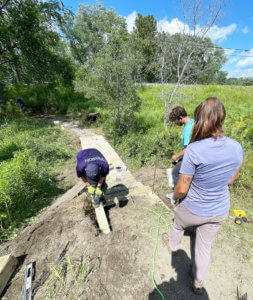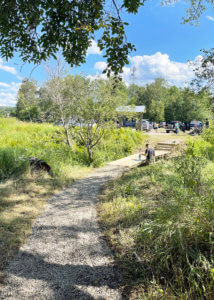 The Northern Forest Canoe Trail has completed a series of projects that will improve safe access to the Connecticut River for paddlers and other users, while enhancing the overnight experience at several campsites.
The Northern Forest Canoe Trail has completed a series of projects that will improve safe access to the Connecticut River for paddlers and other users, while enhancing the overnight experience at several campsites.
Projects included the replacement of a rotten bridge and timber steps at a river access in Colebrook, construction of two moldering privies for use at Moore Reservoir campsites, and the restoration of the Stevenson Campsite in Monroe.
“Our stewardship priorities include maintaining safe access to the woods and waters of the Northern Forest, mitigating negative environmental impacts, and improving the experience for users — our work this summer along the Connecticut River accomplishes all three objectives,” said Noah Pollock, NFCT’s stewardship director. “The Connecticut is a popular river for paddlers. We’re excited for all users to discover this area and do our part to help maintain safe and sustainable access.”
The Colebrook access, on land owned by the Colebrook Economic Development Corporation, is just downstream of Bridge Street.
“This is a popular entry point to the Connecticut River for both paddlers and anglers,” Pollock noted. “The paddling here offers both moving quick water and easy rapids.”
 This access was developed over 15 years ago and had fallen into disrepair. In particular, access steps were rotting and overgrown and a bridge had broken deck boards and was failing structurally. A new bridge and access steps were built from pressure treated lumber that will withstand adverse weather conditions. The trail to the river was regraded and topped with crushed stone. On a hot summer Saturday, the NFCT’s stewardship team was assisted by several volunteers for this work, including Jeffrey Krisko, Parker Castle, Justin Illuzzi, Jenny Leung and Mike Mowry.
This access was developed over 15 years ago and had fallen into disrepair. In particular, access steps were rotting and overgrown and a bridge had broken deck boards and was failing structurally. A new bridge and access steps were built from pressure treated lumber that will withstand adverse weather conditions. The trail to the river was regraded and topped with crushed stone. On a hot summer Saturday, the NFCT’s stewardship team was assisted by several volunteers for this work, including Jeffrey Krisko, Parker Castle, Justin Illuzzi, Jenny Leung and Mike Mowry.
Further downriver, the crew built two moldering privies for primitive campsites near Moore Reservoir managed by Great River Hydro. Finally, the Stevenson campsite in Monroe, NH, was upgraded with a moldering privy and an expanded tenting area. Establishing appropriate sanitary facilities at these sites has long been a priority for trail partners.
This year’s work was also supported by a grant from the Upper Connecticut River Mitigation and Enhancement Fund at the New Hampshire Charitable Foundation, the Coös Economic Development Corporation (CEDC) and donations to the Connecticut River Paddlers’ Trail Stewardship Fund.
To learn more about the NFCT’s stewardship program, contact Noah Pollock at noah@northernforestcanoetrail.